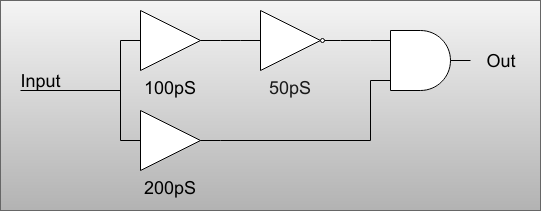We will have a lot more to talk about for timing in future bootcamps. But I wanted you to think about the speed things operate at. FPGAs usually have a speed rating and the tools have great models of how long a signal will take to propagate from point A to point B at a certain temperature.
For simple combinatorial logic like we have in this bootcamp, it won't matter much. The delay through the gates are going to be VERY short (like picosecond-range). However, complex circuits can have issues. Consider a case where a gate takes two inputs. A change on the FPGAs inputs goes through some logic and hits our target gate in 150pS. The other input sees the same outside input change but takes 200pS to do its work.

That means for 50pS the output could be wrong. For example, suppose the circuit were perfect. Because the two inputs of the AND gate are inverse of each other, the output must always be a zero. However, if the input were high for a long time and then switched to low, the top input to the and gate would change in 150pS. The bottom input is still high for another 50pS before the change registers. During that time, the AND gate could put out a high. The truth is, it won't change state instantly, so it may not go high for the entire 50pS.
This is sometimes known as a glitch. The more gates between point A and point B, in general, the longer it is going to take. Sometimes, too, a long routing path will cause a longer delay. You may think this is a dumb example because the output shouldn't be able to change. That's true but I wanted to make a point. Besides, you often see this exact circuit used to detect an edge which takes advantage of the glitch. However, you should NOT try to implement something like this in an FPGA. Instead, just think of the buffers as representing some number of arbitrary gates for the purposes of this example. Exactly what it doesn't isn't important.
We will learn a way around this problem in the next bootcamp (with sequential logic). However, that will cause timing problems of its own and we will have to learn how to work through those as well.
 Al Williams
Al Williams
Discussions
Become a Hackaday.io Member
Create an account to leave a comment. Already have an account? Log In.